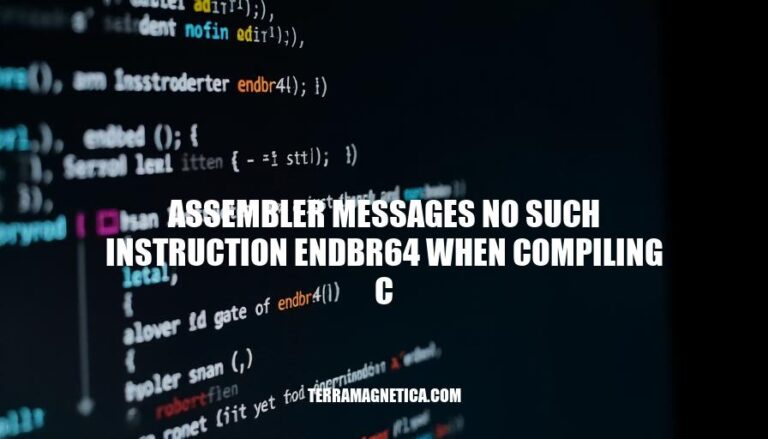


When compiling C code, developers might encounter the error message: “assembler messages: no such instruction: endbr64“. This issue typically arises when using a GCC toolchain that doesn’t support Control-flow Enforcement Technology (CET) instructions, such as endbr64, which are used for security enhancements. This error is relevant to developers working on systems with older toolchains or those not configured to handle these newer instructions, highlighting the importance of keeping development environments up-to-date.
The endbr64 instruction, short for “End Branch 64-bit,” is used in assembly language to mark valid targets for indirect branches in 64-bit mode. Its primary purpose is to enhance security by helping to detect and prevent certain types of attacks, such as Return-Oriented Programming (ROP) and Jump-Oriented Programming (JOP).
endbr64 ensures that the target of an indirect branch (like a function call or jump) is valid. If the instruction is not found at the target, the processor can generate a fault, preventing the execution of potentially malicious code.endbr64 in the generated assembly code to comply with security features like Intel’s Control-flow Enforcement Technology (CET). This helps protect against control-flow hijacking attacks.endbr64 works with CET to enforce control-flow integrity. This means the processor checks that indirect branches only go to valid, intended locations, enhancing overall system security.Here are some common scenarios that can lead to the “assembler messages: no such instruction: endbr64” error when compiling C code:
Outdated Toolchains: If your GCC or binutils versions are outdated, they might not recognize newer instructions like endbr64, which is part of Intel’s Control-flow Enforcement Technology (CET) introduced in newer processors.
Incompatible Compiler Settings: Using compiler flags that enable CET features on systems or toolchains that do not support them can cause this error. For example, compiling with -fcf-protection on an unsupported setup.
Missing Processor Feature Support: If your processor does not support CET, or if the support is not enabled in the BIOS/UEFI settings, the assembler will not recognize endbr64.
Cross-Compilation Issues: When cross-compiling for a different architecture, the target toolchain might not support the endbr64 instruction, leading to this error.
Incorrect Assembler Version: The assembler (part of binutils) might be too old to recognize the endbr64 instruction. Updating binutils can resolve this issue.
Addressing these issues typically involves updating your toolchain, ensuring compatibility of compiler settings with your hardware, and verifying processor feature support.
: GitHub Issue on OpenBSD
: GitHub Issue on Ubuntu 16.04
: GitHub Issue on Ubuntu 20.04
: Stack Overflow on MinGW
: GitHub Issue on x86 IBT Feature
Sure, here’s a step-by-step guide to troubleshoot and resolve the ‘assembler messages no such instruction: endbr64‘ error when compiling C code:
Update Toolchains:
sudo apt-get update
sudo apt-get install gcc
sudo apt-get update
sudo apt-get install binutils
Disable CET (Control-flow Enforcement Technology):
-fcf-protection=none flag to your compiler options:gcc -fcf-protection=none -o outputfile sourcefile.c
Verify Processor Compatibility:
endbr64 instruction. This instruction is part of Intel’s CET, which is available on newer processors. You can check your CPU’s capabilities using:lscpu | grep 'Model name'
Adjust Compiler Settings:
-fcf-protection=none flag to your CFLAGS:CFLAGS += -fcf-protection=none
Rebuild the Project:
make clean
make
Check for Assembly Code:
endbr64 instruction directly. Replace it with a compatible instruction or byte sequence if necessary.By following these steps, you should be able to resolve the ‘no such instruction: endbr64‘ error. If you encounter further issues, consider consulting the documentation for your specific toolchain or reaching out to the community for support.
Problem Encountered: A developer on OpenBSD 7.2 faced the error no such instruction: endbr64 during the linking stage of their C project.
Identification: The developer realized the issue was related to the GCC toolchain being broken or outdated.
Solution: They fixed the GCC toolchain and set the default C++ compiler to clang++ using the command export CXX=clang++.
Problem Encountered: While building a project on Ubuntu 16.04, a developer encountered the endbr64 instruction error.
Identification: The issue was identified as being related to the Control-flow Enforcement Technology (CET) protection, which uses endbr instructions.
Solution: The developer either built the latest binutils from sources or disabled CET-protection by applying a patch.
Problem Encountered: A developer using GCCcore-6.4.0 on Ubuntu 20.04 faced the endbr64 instruction error during the build process.
Identification: The error was traced back to the assembler not recognizing the endbr64 instruction, likely due to an outdated assembler.
Solution: Updating the assembler to a version that supports endbr64 resolved the issue.
These examples highlight common scenarios where developers encountered the endbr64 error and the steps they took to resolve it. If you have a similar issue, checking your toolchain and updating relevant components might help.
The error no such instruction: endbr64 occurs when the assembler does not recognize the Control-flow Enforcement Technology (CET) protection instruction, typically due to an outdated assembler or toolchain.
endbr64 instruction.endbr64 instruction directly.It is essential to keep toolchains up-to-date, as outdated versions can lead to compatibility issues. Understanding processor-specific instructions and their requirements is also crucial in resolving such errors.